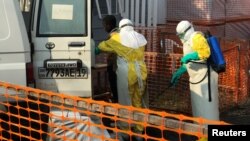As the Ebola epidemic in the eastern Democratic Republic of Congo enters its second year, experts from the World Health Organization (WHO) are voicing concern about the growing risk of the virus spreading to neighboring countries.
Fears that the deadly Ebola virus could spread to Congo's nine neighboring countries are growing with the death of the second person confirmed to have had the disease in Goma, a city of more than one million people. Goma, the capital of conflict-ridden North Kivu province, borders Rwanda and DRC's gateway to the rest of the world.
Uganda has had three imported cases of Ebola. While it has successfully contained the spread of the disease, WHO experts warn of the potential dangers should the virus enter South Sudan, which is a particularly vulnerable, unstable country.
This is the 10th Ebola outbreak over the past four decades in the DRC. The executive director of WHO Emergencies, Michael Ryan, finds this current one presents unprecedented challenges.
Ryan notes previous outbreaks were generally small, self-contained, and often confined to remote rural areas. This has changed. He says factors such as a conflict, forced migration, unsafe health facilities, and disease amplification are increasing the risks from emerging diseases.
"So, the risk of an individual disease emerging may not change," he said. "But, the impacts of those emergencies are changing. In that sense it is a new normal and we need to be ready…About 80 percent of our high-impact epidemic responses are in fragile, conflict-affected, and vulnerable countries. So, about 30 countries around the world represent around 80 percent of these high-impact epidemics."
Ryan says African countries need international assistance to help them strengthen their fragile health systems. Without this aid, he warns, Congo and other nations will have great difficulty in tackling future outbreaks of Ebola and other emerging diseases.
The World Health Organization has deployed more than 700 international experts in the field. The U.N. agency says it is scaling up Ebola preparation measures in the neighboring countries, especially Burundi, Uganda, South Sudan and Rwanda, which are most at risk.
It says frontline health workers are being vaccinated against the disease, more Ebola treatment centers are being set up, and more than 3,000 health workers are screening people for the virus at major points of entry.





